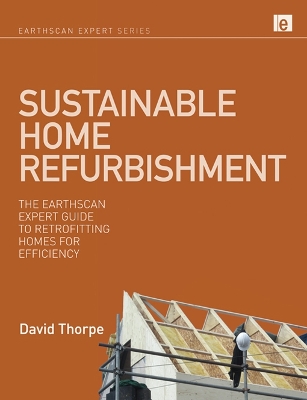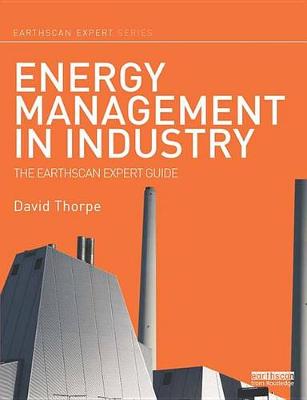Earthscan Expert
8 total works
A retro-fit offers many benefits: cutting electricity and heating bills, increasing the resale value of homes, slashing carbon emissions and creating a healthier place to live. This book is the guide to making it happen. It looks at:
- draught-proofing, insulation and damp
- ventilation, heating and cooling
- electrical efficiency and...
A retro-fit offers many benefits: cutting electricity and heating bills, increasing the resale value of homes, slashing carbon emissions and creating a healthier place to live. This book is the guide to making it happen. It looks at:
- draught-proofing, insulation and damp
- ventilation, heating and cooling
- electrical efficiency and renewable energy
- water use and re-use
- materials' life cycles and incorporating nature
- protection from climate change impacts - modelling energy flows and embodied energy
- how we can meet the need to cut carbon emissions from dwellings by eighty percent by 2050.
Projects can apply to apartment blocks, recent builds and older, solid-walled properties. Enlivened with helpful diagrams and photographs, plus plenty of pointers for further information, it provides a comprehensive resource handbook for any building professional and contractor, students – or any homeowner serious about efficiency (cash and carbon) savings.
The role of the energy manager has evolved significantly as the task of cutting greenhouse gas emissions from buildings has become increasingly important. Managers are now technical experts, negotiators, construction project managers, procurement specialists, efficiency advocates and often provide energy services to others.
This comprehensive book covers how...
Read moreThe role of the energy manager has evolved significantly as the task of cutting greenhouse gas emissions from buildings has become increasingly important. Managers are now technical experts, negotiators, construction project managers, procurement specialists, efficiency advocates and often provide energy services to others.
This comprehensive book covers how to:
* conduct an energy audit
* plan a monitoring and verification strategy
* make any energy-saving campaign successful
* evaluate and make the financial case for energy-saving measures
* make use of free energy for lighting and managing heat loss and gain.
It also contains special chapters on:
* ventilation, heating and cooling
* demand management through automated systems
* lighting
* most requirements of industrial facilities
* regulatory requirements in Britain, Europe and the United States
* the use of smart meters and monitoring
* how to achieve zero energy buildings
* the use of renewable energy.
For all professional energy, building and facilities managers, energy consultants, students, trainees and academics. It takes the reader from basic concepts to the latest advanced thinking, with principles applicable anywhere in the world and in any climate.
Sustainable Home Refurbishment: The Earthscan Expert Guide to Retrofitting Homes for Efficiency
by David Thorpe
The role of the energy manager has evolved significantly as the task of cutting greenhouse gas emissions from buildings has become increasingly important. Managers are now technical experts, negotiators, construction project managers, procurement specialists, efficiency advocates and often provide energy services to others. The book covers how to:
*...
Read moreThe role of the energy manager has evolved significantly as the task of cutting greenhouse gas emissions from buildings has become increasingly important. Managers are now technical experts, negotiators, construction project managers, procurement specialists, efficiency advocates and often provide energy services to others. The book covers how to:
* conduct an energy audit
* plan a monitoring and verification strategy
* make any energy-saving campaign successful
* evaluate and make the financial case for energy-saving measures
* make use of free energy for lighting and managing heat loss and gain.
It also contains a special chapters on:
* demand management through automated systems
* the management of data centres
* regulatory requirements in Britain, Europe and the United States
* the use of smart meters and monitoring
* how to achieve zero energy buildings
For all professional energy, building and facilities managers, energy consultants, students, trainees and academics. It takes the reader from basic concepts to the latest advanced thinking, with principles applicable anywhere in the world and in any climate.
Solar energy is free, abundant and sustainable, with many methods existing to harness it. This guide is the essential introduction to the subject, explaining how the technologies work, how best they should be employed, and the costs and benefits of using them. It provides detailed yet accessible coverage of:
- passive...
Solar energy is free, abundant and sustainable, with many methods existing to harness it. This guide is the essential introduction to the subject, explaining how the technologies work, how best they should be employed, and the costs and benefits of using them. It provides detailed yet accessible coverage of:
- passive solar building
- solar water heating
- solar space heating
- other solar thermal applications (such as cooling and desalination)
- grid-connected photovoltaics
- stand-alone photovoltaics.
It also introduces the reader to larger scale applications such as concentrating solar power. Highly illustrated in full colour, this is the perfect primer for anyone who wants to work with or simply learn more about solar technologies.
This guide looks at the many ways available to energy managers to achieve or even exceed this level of performance, including:
- base-lining consumption
- planning a monitoring and verification strategy
- metering (including smart, wireless metering)
- energy supply management
- motors and drives
- compressed air and process controls.
Uniquely, it includes a whole chapter on greening data centres. It also looks at topics covered in greater detail in its companion volume, Energy Management in Buildings: insulation, lighting, renewable heating, cooling and HVAC systems. Further chapters examine minimising water use and how to make the financial case, both to prioritise measures for cost effectiveness, and to get management on board.
This title is aimed at all professional energy, industry and facilities managers, energy consultants, students, trainees and academics and can be read alongside training for ISO 50001 - Energy Management Systems. It takes the reader from basic concepts to the latest advanced thinking, with principles applicable anywhere in the world and in any climate.







